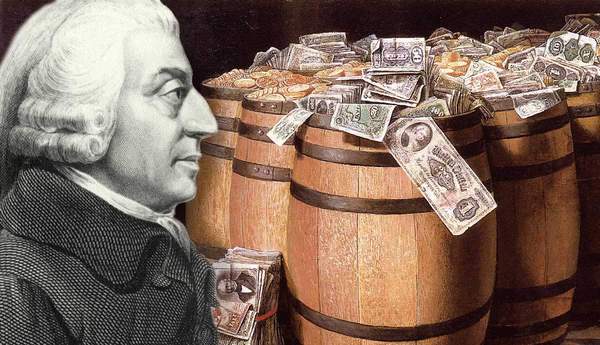Adam Smith on the origin of profits
 This year is the centenary of two of the pioneers in the study of what is now called the capitalist economy. Sir William Petty was born 400 years ago in May and Adam Smith 300 years ago this month. Smith is by far the better known but Petty deserves credit for succinctly expressing a key part of the Labour Theory of Value: ‘labour is the Father and active principle of Wealth, as Lands are the Mother’. In other words, wealth is produced by humans exercising their physical and mental energies to transform materials that originally came from nature into useful things.
This year is the centenary of two of the pioneers in the study of what is now called the capitalist economy. Sir William Petty was born 400 years ago in May and Adam Smith 300 years ago this month. Smith is by far the better known but Petty deserves credit for succinctly expressing a key part of the Labour Theory of Value: ‘labour is the Father and active principle of Wealth, as Lands are the Mother’. In other words, wealth is produced by humans exercising their physical and mental energies to transform materials that originally came from nature into useful things.
This was so obvious that Smith took it for granted, as in the opening lines of The Wealth of Nations, published in 1776:
‘The annual labour of every nation is the fund which originally supplies it with all the necessaries and conveniences of life which it annually consumes…’
This is not yet a labour theory of ‘value’ (a theory of what lies behind the price of goods when they are produced for sale) but modern economics textbooks refuse to acknowledge that only ‘labour’ — humans working on materials from nature — creates new wealth. They want a role for ‘entrepreneurs’, as they call capitalists. What they are trying to do is to provide a justification for profits. They could do this, as in fact Smith does, without denying that wealth is only created by humans working on materials from nature, but they are not prepared to accept even this because of its possible anti-capitalist implications.
Smith does in fact go on to put forward a labour theory of value. But, even on the basis that only human work produces wealth, Smith can be shown as accepting that profits derive from what wage-workers produce.
He argues that, in an early stage of economic development, producers did receive the full product of their labour, but once a stock of wealth, in the form of instruments of production and means of subsistence, had come to be owned by individuals, the position changed. The producers had to cede a portion of what they produced to their employer:
‘As soon as stock has accumulated in the hands of particular persons, some of them will naturally employ it in setting to work industrious people, whom they will supply with materials and subsistence, in order to make a profit by the sale of their work, or by what their labour adds to the value of the materials. In exchanging the complete manufacture either for money, for labour, or for other goods, over and above what may be sufficient to pay the price of the materials, and the wages of the workmen, something must be given for the profits of the undertaker of the work who hazards his stock in this adventure. The value which the workmen add to the materials, therefore, resolves itself in this case into two parts, of which the one pays their wages, the other the profits of their employer upon the whole stock of materials and wages which he advanced. He could have no interest to employ them, unless he expected from the sale of their work something more than what was sufficient to replace his stock to him; and he could have no interest to employ a great stock rather than a small one, unless his profits were to bear some proportion to the extent of his stock’ (p. 37, chapter VI of Book I, italics added).
This is Smith explicitly saying that profits come from the value added to capital by the work of those employed, even if he considers this justified by the risk taken by the employer.
He repeats this later when discussing productive and unproductive labour (where he is using the word ‘manufacturer’ in its original and logical sense of someone who makes something with their hands, not its current distorted meaning of ’employer’):
‘There is one sort of labour which adds to the value of the subject upon which it is bestowed: there is another which has no such effect. The former, as it produces a value, may be called productive; the latter, unproductive labour. Thus the labour of a manufacturer adds, generally, to the value of the materials which he works upon, that of his own maintenance, and of his master’s profit. The labour of a menial servant, on the contrary, adds to the value of nothing. Though the manufacturer has his wages advanced to him by his master, he, in reality, costs him no expense, the value of those wages being generally restored, together with a profit, in the improved value of the subject upon which his labour is bestowed. But the maintenance of a menial servant never is restored. A man grows rich by employing a multitude of manufacturers: he grows poor, by maintaining a multitude of menial servants’ (p. 253-4, chapter III of Book II, italics added).
Smith was no socialist and he did advocate laissez-faire capitalism, but this doesn’t detract from the fact that he accepted a theory of wealth which showed that profits derive from what wage-workers produce.
ALB
